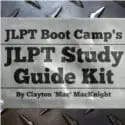 This is a continuing series on the common mistakes people make studying for the JLPT. If you’ve missed out on the first part of the series. I encourage you to go back and read part 1. Otherwise please enjoy the show.
This is a continuing series on the common mistakes people make studying for the JLPT. If you’ve missed out on the first part of the series. I encourage you to go back and read part 1. Otherwise please enjoy the show.
Last week, I talked about a common mistake that a lot of people make with flashcards. Flashcards still play a role in language learning and vocabulary digesting, but they aren’t a panacea (which is a big fancy word for cure-all).
They are just one part of the vocabulary learning arsenal that you have at your disposal. There are other tools you can utilize to become a well-rounded vocabulary learning machine. All work and no play makes Jack a dull boy. So let’s get to our 2nd most common mistake:
Mistake #2 – Just studying the lists
You’ve probably seen them out there on the net. They seem to be the hottest thing available – the lists. There are lists of vocabulary, there are lists of grammar, there are lists of kanji, and there are lists of expressions.
The only thing these are really useful for are for reference, or at most refreshers. They shouldn’t be the backbone of your study plan. You should try to be supplementing it with something else.
You may ask yourself why? I mean, it is pretty easy to just grind through vocabulary till you can spew forth translations of all the words like nobody’s business. I mean that’ll get you through the test right?
Well, it’ll probably get you through the first couple of tests (N5, N4, and maybe N3). I suppose if you tried really hard, it might get you through the higher ones as well, but the JLPT also tests your ability to use the word, not just translate it.
Besides, the whole point of studying a language is to use it for whatever reason, travel, business, fun, video games, or simply just being able to watch Japanese commercials of hit TV show stars.
You need to be able to use the word and that means what kind of context and situations you use it in as well as the connotation of the word. Sometimes this is quite easy, I mean everyone knows what a dog is and when to use that word.
But it can get a little more difficult for say 激しい(はげしい) which can mean violent or intense. It can be used to describe everything from a battle to a busy street, though. Would you know that you can say 交通の激しい通り (The busy street), just by looking at the definition – violent, intense – in your flashcards?
So, how do you learn how to use these words? What can you do to learn how to use them?
Solutions to the Problem
The first one is quite obvious. You can use them! Write down all the new words you learned for the day from your flashcards or other sources and try to use them as much as possible in conversations that you have with people.
If you are out of Japan, you can accomplish almost the same thing by doing some writing and submitting it to lang8 or another such resource. There are also social networks galore packed with people that are looking to connect and practice language.
Read Those things called books
Before blogs, people use to get information from things called ‘books’. They are still available today for you to read. Most books aimed at elementary school students are perfect for people studying for the N2. For N1, you can read regular novels.
For lower than the N2, there are graded readers available. These are especially designed for people studying Japanese and have vocabulary that is graded to the certain levels. You can pick up graded readers for N3, N4 and even N5 at White Rabbit Publishing as well as most major big book stores in Japan.
I’ve read through some of these graded readers and have to say they are semi-useful and usually interesting. They have the right idea, but some of the topics are a little boring (at least for my tastes). So, be sure to read through the first couple lines of each story to see if it’s something that strikes your fancy.
I’ve since graduated to movie adaptions which is a genre I highly recommend because if you’ve already seen the movie you can picture the book very easily. I recently polished off Mr. Incredible, a riveting piece of literature to be sure.
At the Very Least…
Take the time to look at any unusual-looking words in WWWJDIC and take a look at the example sentences. The Imiwa? app for iPhone also has the same functionality.
Looking at these example sentences will give you an idea of how to use the word and what kind of situations it is normally used in.
Action Steps
1) What do you do to practice the usage of vocabulary? Do you read? Do you speak it?
2) What are some difficult words that you’ve had problems with the usage? Or you saw on the test and had problems with?
Let me know in the comments below!
Image by d3b…, available under the Creative Commons 2.0 Generic License











How do you study vocab? You add it to anki and when you review you write down the words/sentences with kanji or you just practice your kanji recognizing skills?
I found out yesterday on a forum that most followers of AJATT have a immensely large vocab because they neglect writing and only learn how to read/recognize words. I personally learn how to write, that’s why it’s so boring and it takes time.
Thanks!
I guess most of my writing I do on my iPhone. When I email my Japanese friends, I use it to help me pick the write kanji. It’s bit like cheating though. It will help you write the sentences, so you don’t have to do a lot of work.
I use to practice doing a lot of writing on the DS as well, but now I’m just focusing on learning a lot of vocabulary for N2.
Hello MAC:
First, Thank you for your website and all your helpful suggestions. I have been learning a lot from it recently.
In relation to learning vocabulary, on a recent post, you stated that the JLPT1 vocabulary is 10,000 – 18,000 words? I am wondering: Are there any reputable updated (ie. for the new exam) lists out there to study in Anki?
I know my question is contrary to most of what you just wrote in this post (And I do agree entirely with what you wrote here) :o)
But the thing is, I have already been doing lots of listening to movies, and lots of reading (Especially taiyaku books with both English and Japanese side by side). As I plan to take the test in July, I feel I need to make my studying more well-rounded, and I want to incorporate a little bit of (dull, yes I know) methodical flashcard vocabulary usage (while of course retaining my high volume of reading).
Any help would be greatly appreciated! Thanks again!
I don’t know of any good N1 lists yet. I’d guess though that Jonathan Waller’s list is fairly accurate and will give you a good foundation of vocabulary to double check your vocab knowledge. Do you use Anki at all to review words you found in books and movies? I have time and again gotten questions on the test about words I encountered in books. The general reading section usually has passages written in the ‘list’ vocabulary, but the vocabulary section is generally more involved.
Jonathan says on his site that the list contains about 10,000 so it is not the ‘full’ list, but I’m sure it will get you pretty close if you combine it with the vocabulary you’ve been studying from the books.
If you are planning to take the test in July, you can just skip past the words you already know and study the words that are unfamiliar to you. The list will fill in any holes that might be missing. You might also want to diversify your reading a little bit and pick up a Japanese novel or two to build up your comprehension without the aid of translation. The Taiyaku books are great, but need to build up your ability to comprehend the passage without the use of English at all.
Also, the Kanzen Master series are generally pretty merciless with the test. I haven’t tried the N1 vocab book, but it might be worth picking up to, again, fill in the holes as well as get some drill practice in.
I used Mac’s Memrise course to learn hiragana and katakana, but it was a frustrating proposition, because I had just installed the MS IME and was pretty clumsy with it. But I did pick up the basics, to the point where I can use it for vocabulary learning.
What I’m doing now is learning to type the basic vocabulary on the lists (well, the first list) of the Vocabulearn series. Youtube has videos with the words – English then Japanese – read against an intermittent background of classical music with a screen presentation of the words, so you can practice typing the words with nothing but sound input (eventually). The music definitely helps keep the frustration level down, and you can concentrate on inputting the strokes steadily and developing muscle memory. And concentrating on the words while you type them multiple times (with the video paused) certainly helps to imprint them on the brain. These particular words may not be interesting to anyone here, but making your own homebrew files with a musical background and the audio of the words you’re learning is an idea I’ll be considering once I’ve come to the end of the Vocabulearn videos. Or somebody could make a fortune by making similar files of JLPT lists, maybe with provision for typing in the words with the video automatically paused (for a predetermined length of time) and the words blanked out. With perhaps images related to the words? That would probably be overkill.
There’s a similar set of youtube videos for Arabic – a totally barebones production: no music, no images of scenery with the spelled-out words superimposed. It’s an entirely different and tedious exercise, worse than an SRS.
I just go through a list of vocabulary using the minna no nihongo textbook. I dont have instances to use some of these words hence i forget easily.
Yeah, It is sometimes to find useful vocabulary when you are just starting out. But, it does help to make a list of words for things that you do talk about on a regular basis.
Hi there, some years ago I had a very good learning app on the iPhone, isn’t there any app any more? We are in the 21st century, I do not want to see any lists…..